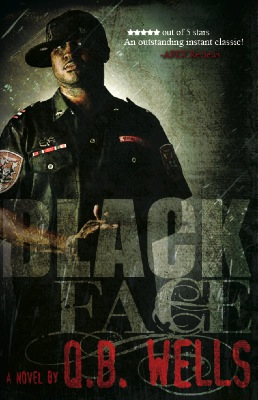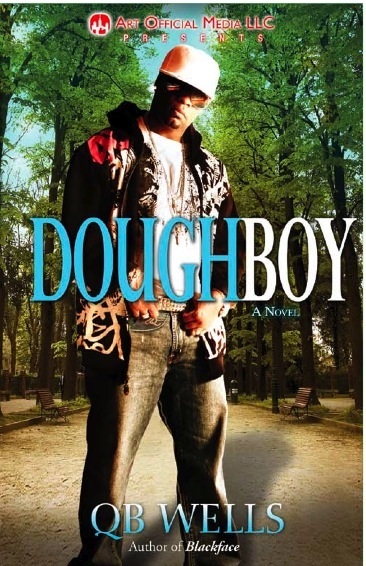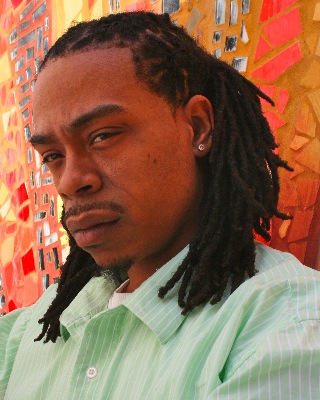QB Wells, is not just an author trying to make a name for himself, but if you have as much determination as he does, he just may publish your book. He’s an editor, writer, publisher and creator of two websites that give independent authors free advice on how to promote their work and get it distributed. What I admire about Mr. Wells is that he writes about issues that occur in the Black community, but others are afraid to address. I definitely wanted to tackle where he gets his motivation, his secret to being a successful Street Fiction author, and oh yeah, ask exactly what Street Fiction is.
Parlé Magazine: How old were you when you wrote your first story & did you know then that writing was a passion of yours?
QB Wells: In high school I knew I was a pretty good writer, but it wasn’t my passion. In college I started writing short stories. I remember I wrote a story about a man who wanted to commit suicide because of a girl. I wrote it in first person and the professor sent me to see a therapist.
Parlé: Besides the required writing assignments in school, did you find yourself writing stories just for yourself?
QB Wells: Oh all the time. I did creative short stories outside of class. My life was crazy, I didn’t know what else to do. I started penning it down while my friends focused on music. I wrote fraction notes like, “police stopped kids, checked their mouth for dope,” and turned them into stories.
Parlé: What inspires you to write?
QB Wells: A voice. Certain narratives that aren’t being told, especially from an introspective part. More stories need to be told from our culture. People aren’t concerned with how people of color think. They go off actions and exteriors. A lot of stories haven’t been told. They go off crime and nothing else.
Parlé: You’ve been titled as writing Street Fiction, what is that & how does it stand out from other genres?
QB Wells: Street Fiction is telling stories of urban environment to an audience that is familiar with buying and selling things on the street. At one point I didn’t have a job, but I had books. I found out about street vendors and where the market is that relates to my stories and started selling my books. Some people never buy from bookstores, only from street vendors.

Parlé: Have you ever written about personal experiences?
QB Wells: Some stories are personal. I’ve wrote about when I sold drugs or robbed for drugs. I hate talking about it. I’ve fed symbolism into my characters; meaning I’ve taken bits and pieces of my personal life and instilled them into my characters.
Parlé: I read that you were inspired by Hip-Hop, such as an old Nas album. Music has definitely changed since his first record, so does it still inspire you?
QB Wells: I do still see narrative in Hip-Hop artist. I like Young Jeezy. His story is authentic. I feel it. Also, UGK tells narratives. It’s not as inspiring as it used to be part of the culture.
Parlé: Tell me about your novels Dough Boy & Black Face. Why should readers pick those up and buy them?
QB Wells: Dough Boy is about a man that sells cocaine. His life falls apart. Usually you don’t get a dealer’s point of view. For him selling drugs is as addictive as it is to the addict. No one looks at problems because they don’t know what to do with their life. He doesn’t know what else to do with his life besides sell dope. Cocaine is so engrained in peoples’ lifestyle that it needed to be looked at.
Black Face focuses on four boys in Chicago that deal with gangs, love, self -hate, and violence. This novel focuses on more traditional things that occur in Black space.
Parlé: How did the opportunity come to edit the book Nookie?
QB Wells: She needed an editor, really, and I loved the story. She needed it published and I ended up editing it. I also took on a lot of coverage and packaged it.
Parlé: How long does it take you to edit someone else’s work?
QB Wells: Hers took a lot longer than usual because I had never edited a manuscript. I put my own money into her book. That project took me several weeks to edit. Now it takes between 2-4 weeks, depending on the word count.
Parlé: How long does it take you to create a concept & write a book?
QB Wells: Concepts come all the time for me. When I see stuff on the news or things happening in the streets of Baltimore or Chicago, I take notes that I know can transform into a bigger story. I create an outline and then start writing. The entire process takes me about three months. One month to create and then revise; assuming the story is between 300-450 pages.
Parlé: Can you tell us what UrbaniaMag is & how it can help authors?
QB Wells: I like to give more perspective for urban authors. I didn’t see anyone do it on a consistent basis. I wanted to be an advocate for literacy and give insight from other authors also. The website shows how to package yourself, create a media kit, setup author tours, and virtual tours. There are also articles on the arts. It’s a great site for those independence grinders.
Parlé: What is Art Official Media LLC?
QB Wells: It’s a publishing company that markets books. We’re actually moving on to marketing services. We strive on providing a platform for other authors.
Parlé: What does it take for you to want to publish a book?
QB Wells: Determination. I need to know that you’re serious about publishing and that you want it as a career. You need to show me that you don’t think this is a short-term plan and [you] are willing to do what others won’t to sell their books. Have the same determination that I do.
Parlé: What advice can you give to writers that want to get published BUT don’t want their book published in the urban literature section like the others?
QB Wells: Well you can’t have Black faces on your covers and expect to get outside the audience. Not as many people buy books with Black faces on the cover. You have to have marketing that blends in to other books. It’s good to have symbols, guns, bullets, and less images of people; and not faces. Also, don’t give it to street vendors. Don’t work in the same circle as those trying to sell their books in the urban section. I chose to go in those circles because I like to be celebrated. I don’t like to be in those crowds. If they do it, they won’t be in those crowds either.
Parlé: Are you noticing that writing about certain subjects makes it easier to get our books published? If so, what subjects?
QB Wells: Street fiction is easy for small publishers. Urban fiction is another genre but there’s a lot of stuff not being talked about in our culture such as education, finance and literacy. Anything that’s real is harder when sold in Black communities.
Parlé: How do you think an author can stay relevant when books are coming out every week?
QB Wells: You just have to market like crazy and get people to see them. Meet people as much as you can. When you see them in person or at a book signing it’s equivalent to meeting you than just seeing you online. People will look over you if you only promote yourself online. It’s better if you’re in people’s faces and have human interaction.
Parlé: What are you working on now?
QB Wells: Right now I’m editing the sequel to Black Face. I’m writing a new novel titled 100 Miles and Running. It will come out next year. I’m also sitting back and editing the sequel to Nookie titled Ill Nana. I’m going to chill for a couple of months, tour and get on the streets. I’m in marketing mode at the moment, not so much in writing.

Parlé: What books do you recommend we read this summer?
QB Wells: Dough Boy and 145th Street Stories by Walter Dean Myers
Parlé: What advice can you give to writers who feel that their work will never get published?
QB Wells: Get courage. If you don’t stand by it enough to push it then you won’t get it out. You’ll do whatever it takes to get it out. So many individual publishers will publish you as long as your work is up to par.
Parlé: If a book isn’t sold in Borders or Barnes & Noble, do you think it has the ability of getting as much attention?
QB Wells: It could possibly get just as much attention, but may not get as many copies sold. If enough people know about your book then the franchise stores may stock it.
Parlé: Any last words?
QB Wells: I am a fan of Parlé magazine. I like what you’re doing. Keep up the great work Kevin.

